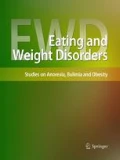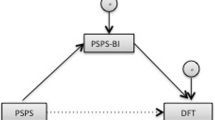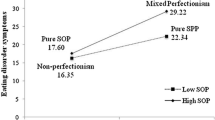Abstract
Purpose
Numerous studies have found perfectionism to show positive relations with eating disorder symptoms, but so far no study has examined whether perfectionistic self-presentation can explain these relations or whether the relations are the same for different eating disorder symptom groups.
Methods
A sample of 393 female university students completed self-report measures of perfectionism (self-oriented perfectionism, socially prescribed perfectionism), perfectionistic self-presentation (perfectionistic self-promotion, nondisplay of imperfection, nondisclosure of imperfection), and three eating disorder symptom groups (dieting, bulimia, oral control). In addition, students reported their weight and height so that their body mass index (BMI) could be computed.
Results
Results of multiple regression analyses controlling for BMI indicated that socially prescribed perfectionism positively predicted all three symptom groups, whereas self-oriented perfectionism positively predicted dieting only. Moreover, perfectionistic self-presentation explained the positive relations that perfectionism showed with dieting and oral control, but not with bulimia. Further analyses indicated that all three aspects of perfectionistic self-presentation positively predicted dieting, whereas only nondisclosure of imperfection positively predicted bulimia and oral control. Overall, perfectionistic self-presentation explained 10.4–23.5 % of variance in eating disorder symptoms, whereas perfectionism explained 7.9–12.1 %.
Conclusions
The findings suggest that perfectionistic self-presentation explains why perfectionistic women show higher levels of eating disorder symptoms, particularly dieting. Thus, perfectionistic self-presentation appears to play a central role in the relations of perfectionism and disordered eating and may warrant closer attention in theory, research, and treatment of eating and weight disorders.
Similar content being viewed by others
Notes
The model differentiates a third form of perfectionism, other-oriented perfectionism, which is unrelated to eating disorder symptoms [1] and so was disregarded in the present study.
Because the platform gave participants unlimited time for completing the measures, the median is a better reflection of the average completion time than the mean.
In Step 3, the critical information is how the ΔR² values of Step 3 in Series 2 differ from those in Series 1. (The regression weights in Step 3 are the same in Series 1 and 2.)
References
Bardone-Cone AM, Wonderlich SA, Frost RO, Bulik CM, Mitchell JE, Uppala S, Simonich H (2007) Perfectionism and eating disorders: current status and future directions. Clin Psychol Rev 27:384–405. doi:10.1016/j.cpr.2006.12
Wade TD, O’Shea A, Shafran R (2016) Perfectionism and eating disorders. In: Sirois FM, Molnar DS (eds) Perfectionism, health, and well-being. Springer, New York, pp 205–222. doi:10.1007/978-3-319-18582-8_9
Flett GL, Hewitt PL (2002) Perfectionism and maladjustment: an overview of theoretical, definitional, and treatment issues. In: Hewitt PL, Flett GL (eds) Perfectionism: theory, research, and treatment. American Psychological Association, Washington, pp 5–31. doi:10.1037/10458-001
Hewitt PL, Flett GL (1991) Perfectionism in the self and social contexts: conceptualization, assessment, and association with psychopathology. J Pers Soc Psychol 60:456–470. doi:10.1037/0022-3514.60.3.456
Frost RO, Marten P, Lahart C, Rosenblate R (1990) The dimensions of perfectionism. Cognitive Ther Res 14:449–468. doi:10.1007/BF01172967
Hewitt PL, Flett GL (2004) Multidimensional Perfectionism Scale (MPS): technical manual. Multi-Health Systems, Toronto
Bardone-Cone AM (2007) Self-oriented and socially prescribed perfectionism dimensions and their associations with disordered eating. Behav Res Ther 45:1977–1986. doi:10.1016/j.brat.2006.10.004
Chang EC, Ivezaj V, Downey CA, Kashima Y, Morady AR (2008) Complexities of measuring perfectionism: three popular perfectionism measures and their relations with eating disturbances and health behaviors in a female college student sample. Eat Behav 9:102–110. doi:10.1016/j.eatbeh.2007.06.003
Lampard AM, Byrne SM, McLean N, Fursland A (2011) The Eating Disorder Inventory-2 perfectionism scale: factor structure and associations with dietary restraint and weight and shape concern in eating disorders. Eat Behav 13:49–53. doi:10.1016/j.eatbeh.2011.09.007
Soares MJ, Macedo A, Bos SC, Marques M, Maia B, Pereira AT, Gomes A, Valente J, Pato M, Azevedo MH (2009) Perfectionism and eating attitudes in Portuguese students: a longitudinal study. Eur Eat Disord Rev 17:390–398. doi:10.1002/erv.926
Hewitt PL, Flett GL, Ediger E (1995) Perfectionism traits and perfectionistic self-presentation in eating disorder attitudes, characteristics, and symptoms. Int J Eat Disord 18:317–326. doi:10.1002/1098-108X(199512)18:4<317:AID-EAT2260180404>3.0.CO;2-2
Garner DM, Olmsted MP, Bohr Y, Garfinkel PE (1982) The Eating Attitudes Test: psychometric features and clinical correlates. Psychol Med 12:871–878. doi:10.1017/S0033291700049163
Welch E, Miller JL, Ghaderi A, Vaillancourt T (2009) Does perfectionism mediate or moderate the relation between body dissatisfaction and disordered eating attitudes and behaviors? Eat Behav 10:168–175. doi:10.1016/j.eatbeh.2009.05.002
Hewitt PL, Flett GL, Sherry SB, Habke M, Parkin M, Lam RW, McMurtry B, Ediger E, Fairlie P, Stein MB (2003) The interpersonal expression of perfection: perfectionistic self-presentation and psychological distress. J Pers Soc Psychol 84:1303–1325. doi:10.1037/0022-3514.84.6.1303
Hewitt PL, Habke AM, Lee-Baggley DL, Sherry SB, Flett GL (2008) The impact of perfectionistic self-presentation on the cognitive, affective, and physiological experience of a clinical interview. Psychiatry 71:93–122. doi:10.1521/psyc.2008.71.2.93
Cockell SJ, Hewitt PL, Seal B, Sherry S, Goldner EM, Flett GL, Remick RA (2002) Trait and self-presentational dimensions of perfectionism among women with anorexia nervosa. Cognitive Ther Res 26:745–758. doi:10.1023/A:1021237416366
Castro J, Gila A, Gual P, Lahortiga F, Saura B, Toro J (2004) Perfectionism dimensions in children and adolescents with anorexia nervosa. J Adolesc Health 35:392–398. doi:10.1016/j.jadohealth.2003.11.094
Bardone-Cone AM, Sturm K, Lawson MA, Robinson DP, Smith R (2010) Perfectionism across stages of recovery from eating disorders. Int J Eat Disord 43:139–148. doi:10.1002/eat.20674
McGee BJ, Hewitt PL, Sherry SB, Parkin M, Flett GL (2005) Perfectionistic self-presentation, body image, and eating disorder symptoms. Body Image 2:29–40. doi:10.1016/j.bodyim.2005.01.002
Cohen J, Cohen P, West SG, Aiken LS (2003) Applied multiple regression/correlation analysis for the behavioral sciences, 3rd edn. Lawrence Erlbaum Associates, Mahwah
Stoeber J, Yang H (2015) Physical appearance perfectionism explains variance in eating disorder symptoms above general perfectionism. Pers Indiv Differ 86:303–307. doi:10.1016/j.paid.2015.06.032
Flegal KM, Carroll MD, Ogden CL, Curtin LR (2010) Prevalence and trends in obesity among US adults, 1999–2008. J Amer Med Assoc 303:235–241. doi:10.1001/jama.2009.2014
Lombardo C, Cuzzolaro M, Vetrone G, Mallia L, Violani C (2011) Concurrent validity of the Disordered Eating Questionnaire (DEQ) with the Eating Disorder Examination (EDE) clinical interview in clinical and non clinical samples. Eat Weight Disord 16:188–198. doi:10.1007/BF03325131
Tabachnick BG, Fidell LS (2007) Using multivariate statistics, 5th edn. Pearson, Boston
Tzelgov J, Henik A (1991) Suppression situations in psychological research: definitions, implications, and applications. Psychol Bull 109:524–536. doi:10.1037/0033-2909.109.3.524
Frost RO, Heimberg RG, Holt CS, Mattia JI, Neubauer AL (1993) A comparison of two measures of perfectionism. Pers Indiv Differ 14:119–126. doi:10.1016/0191-8869(93)90181-2
Stoeber J, Otto K (2006) Positive conceptions of perfectionism: approaches, evidence, challenges. Pers Soc Psychol Rev 10:295–319. doi:10.1207/s15327957pspr1004_2
Hill RW, Huelsman TJ, Araujo G (2010) Perfectionistic concerns suppress associations between perfectionistic strivings and positive life outcomes. Pers Indiv Differ 48:584–589. doi:10.1016/j.paid.2009.12.011
Trumpeter N, Watson PJ, O’Leary BJ (2006) Factors within multidimensional perfectionism scales: complexity of relationships with self-esteem, narcissism, self-control, and self-criticism. Pers Indiv Differ 41:849–860. doi:10.1016/j.paid.2006.03.014
Pashler H, Wagenmakers E-J (2012) Editors’ introduction to the special section on replicability in psychological science: a crisis of confidence? Perspect Psychol Sci 7:528–530. doi:10.1177/1745691612465253
Cole DA, Maxwell SE (2003) Testing mediational models with longitudinal data: questions and tips in the use of structural equation modeling. J Abnorm Psychol 112:558–577. doi:10.1037/0021-843X.112.4.558
British Psychological Society (2009) Code of ethics and conduct. British Psychological Society, London
Author information
Authors and Affiliations
Corresponding author
Ethics declarations
Conflict of interest
The authors declare that they have no conflicts of interest.
Ethical approval
The study received no external funding. It was approved by the relevant ethics committee and followed the British Psychological Society’s code of ethics and conduct [32].
Informed consent
Informed consent was obtained from all participants.
Rights and permissions
About this article
Cite this article
Stoeber, J., Madigan, D.J., Damian, L.E. et al. Perfectionism and eating disorder symptoms in female university students: the central role of perfectionistic self-presentation. Eat Weight Disord 22, 641–648 (2017). https://doi.org/10.1007/s40519-016-0297-1
Received:
Accepted:
Published:
Issue Date:
DOI: https://doi.org/10.1007/s40519-016-0297-1




